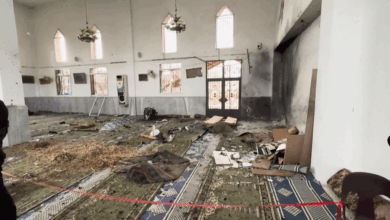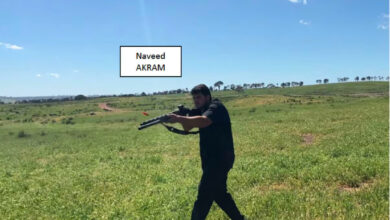Attorney General Abdel Meguid Mahmoud agreed to refer 24 Egyptians and one Palestinian to the Supreme State Security Court on the charges of forming a terrorist cell targeting tourists and Christians, tracking the movements of foreign vessels in the Suez Canal, fashioning electrical devices for terrorist purposes, and the murder of four Christians and the attempted murder of two others at a jewelry store in Zeitoun, Cairo.
At a press conference yesterday, the court’s public attorney, Hisham Badawy, announced details of the decision, the charges, testimonies, and evidence provided in relation to the case.
Prosecution investigations revealed that the main defendant, Mohamed Fahim Hussein (26 years, petroleum engineer from Daqahlia) had obtained a copy of a book written by Abu Musaab el-Soury, an Al-Qaeda leader, titled The Call of International Islamic Resistance. Fahim was inspired by the book’s ideas, which include the excommunication of Arab governments and rulers, and an invitation to commit terrorist attacks against tourists and Christians in Egypt.
The defendant’s undertaken mission was to build a clandestine corps, divided into two groups: one for Cairo and another for Daqahlia.
The second defendant, Mohamed Fahim Ibrahim (30 years, assistant professor at el-Tebbin Institute for Metallurgical Studies) led the Cairo division, and recruited other group members.
The defendants formed an internal consultancy council. Some members supplied the group with funding, cars, diving equipment, remote controls and electrical devices, while at the same time being fully aware of the group’s objectives.
Among the members of the group were the three accused of murdering four Christians at a jewelry store in Zeitoun.
The trio confessed to staking out the store from outside, with two of them executing the murder together while the third waited outside on a motor bike, using the bike’s engine to mask the sound of shooting. They admitted to watching many Coptic-owned stores in Ain Shams and Zeitoun before settling on the store in Zeitoun, which was packed with goods and easier to escape.
The three defendants confessed during the investigations to receiving instructions to carry out the murder from the group’s second man, with the goal of securing funding for the group.
The investigations also revealed that the offenders entered the store wearing wigs and black glasses, and that the motorbike they used was bought using money from another member who is currently free in Italy. On the day of the murder the perpetrators bought three unregistered mobile lines to communicate with each other, but one of them made a phone call to his home, which enabled the police to catch them.
The defendants admitted to following instructions outlined in the book by el-Soury, and said that they had used a mobile phone to make a video clip of their equipment being tested to broadcast on jihadist websites.
Translated from the Arabic Edition.




